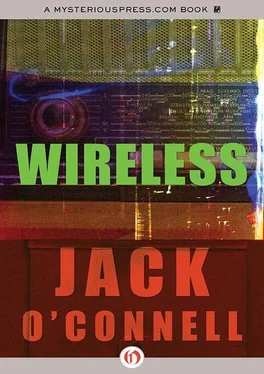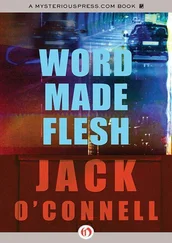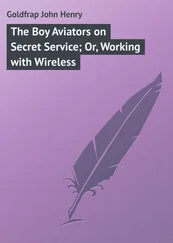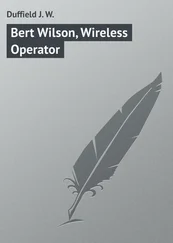“What I want is for the three of us to have a long conversation about your private little broadcast booth behind the fireplace there. And I want some names—”
“We’ll tell you,” Olga yells. “Whatever you want.”
Wallace gives her a confused, maybe pained, look, and Olga’s fear bolts into a surge of anger. She screams, “Don’t you dare look at me like that.”
Wallace puts his hands up over his ears and bites in on his bottom lip. He looks like an oversized pop-art statue, a roadside souvenir that somehow went horribly wrong during the creation process.
Speer’s got them both, turned them against one another. It took less time than he anticipated and he’s more than a little proud of this. He lets his pleasure show by easing the act a bit, smiling, holding up his hands in a joint stop sign to both husband and wife.
“Kids, kids, kids,” he says, “we don’t have to be this way. There’s no need for this behavior. That’s what I’ve been trying to make clear to you all along. I just need a little cooperation. Now, what do you say?”
He saunters to the fireplace, lifts Wallace, and deposits him on the floor.
“Mr. B, you’re an old pro in this department. I took a little tour of your studio there behind the fireplace. Little cramped. From my perspective anyway. But there’s enough evidence behind that wall to take this life away. Take old DeForest Road away. You’ve been here over twenty years. Mortgage is almost paid off, right? We can take away the house, the job, the savings. You’re a CPA, right? Upstanding member of the community and all, right? You’re on committees. You’ve got friends. This little—” he pretends he’s reaching for a correct word—“hobby of yours would surprise them all quite a bit, don’t you think?”
He steps back, offers Olga a hand up without looking at her. She accepts it and gets to her feet.
“Let’s calm down here a second. Let’s catch our breath. Sit down on the couch there, the two of you. Next to each other.”
They comply and he begins a slow pace in front of them, an act he hopes shows just a hint of patience, reasonableness. He stops now and then at the fireplace mantel, leans against it, strikes the pose of a 1950s TV dad, a young Robert Young, a slightly hipper Hugh Beaumont. He gives the tone that he’s rehearsed in the runny mirror of his basement apartment for over a month:
“Okay. I think the three of us need to accept certain givens. Things are not the same right now as they were yesterday. Yesterday your lives had not yet changed. Wallace, you were working on some small company’s tax problems. Olga, you were baking a bundt cake, clearing up last-minute details with Magda down at the Baron. Am I right? Have I done my homework? Okay, overnight things change. That is the nature of life. We don’t like it. As creatures, as animals, we don’t like change. Particularly this type of change. Nightmarish change. And your nightmare has a name. Its name is Agent Speer. I’m your nightmare. I’m sorry, but that’s how it’s worked out. The currents of fate brought us together. Nothing either of us can do about that.”
“Now, Wallace. You have a problem. You’re not alone in this. Thousands of Americans across the country have the same affliction. I view it as a disease, though I really don’t know if, at this point, the AMA would back me up. But I’ve spent some time studying the phenomenon. I’m not some novice jumping into the fray at the last minute. My knowledge has evolved. You people show the same symptoms as an addict, as an abuser. You’re compulsive. Lousy cure percentage, even with help. Help that you don’t want. No matter what the cost to family and friends around you. I don’t know if Mr. Phil Donahue has ever done one of his shows on your affliction, but he ought to. It’d be a genuine public service. To my mind anyway.”
“Right now, you’re saying, ‘What’s the big deal? What have I done that’s so wrong?’ And I want you to know that I understand that type of thought. You’ve been honing it, refining it for so long it’s got a thick sheen over it. But, Wallace, the truth is the truth. At some point, you have to climb up on the step stool and look in the mirror and admit to yourself. You have to look in the mirror, into you own eyes, no one else’s, and say, ‘ God save me, I’m a jammer .’
“There. I said the J-word.” As you’re both well aware, there are very specific laws in this country regarding the transmission and content of radio signals. There are licensing requirements and financial obligations. Papers to be filed. Inspections. Legal documentation. Bonds. The Federal Communications Commission oversees this entire enterprise. It’s an enormous responsibility. There’s so much to be considered.
The air around us is bursting with radio waves. There’s only one way to prevent absolute chaos. And that’s to rely on mutually agreed-upon laws and regulations, standards and practices. There’s a complex system that’s been in existence for a long, long time. It’s grown as culture and technology have changed. The system has evolved with the times.
“Mr. and Mrs. B, I think you’d agree with me that in any system there are bugs. There are inherent, annoying snags. I think bugs is the perfect word. Perfectly descriptive. Maybe it’s part of the nature of things. God’s design, a wrench in the works just to keep us on our toes, keep us from stagnating. Or maybe it’s so we can appreciate normalcy when we manage to glimpse it. I don’t know. I know, very simply, that I’ve been given a job to do. My job is your nightmare. I am an officer of the federal government. I’m a federal cop. My jurisdiction is coast-to-coast. My specialty is search and destroy. Search and destroy bugs in the system of public communications. I’m an exterminator. And you, Wallace, and you, Olga, you are the cockroaches.”
He goes for the long pause, lets the weight of his words settle down on top of them, push them a little deeper into the couch.
“Specifically,” Wallace says, voice on the edge of cracking, “what is it you want from me?”
“Specifically,” Speer says, almost a mimic, but not quite, “I want you to assist me in any and all ways necessary to bring my investigation to an efficient conclusion.”
“You want me to be an informer,” Wallace says.
“I dislike the connotation of the word.”
“You want me to supply you with a list of my associates.”
“Fellow jammers, yeah. That would be a start. I’ll also want their addresses, occupations, where they spend their time, where they purchase their equipment. That sort of thing.”
“And if I don’t assist you?”
Speer pulls in some air, blows it out, shrugs. He takes a handkerchief from a back pocket and blows his nose, refolds the rag, and repockets it.
“Excuse me. Pollen count is murder today.”
“You’ll ruin us,” Olga puts in. “You’ll arrest us, humiliate us. You’ll supply the stations with any information they need for a lawsuit.”
Speer stares down at his wing tips, gives a sheepish grin and a hesitant nod. He says, “Look, you’re bright people. You’ve both been around the block a few times. You don’t need me to explain to you how this life works. You’ve got an above-average imagination. You can envision the consequences. Do you really need me to make a list for you?”
He waits just a second and then, “Of course not. Game’s over. The good guys have won. Say to yourselves, ‘It was fun while it lasted.’ Then do what’s necessary. Protect your way of life, for God’s sake. Look, Wallace, you’re the patriarch, as far as I can see. My files say you’ve been at this since the beginning, early fifties, am I right? These younger jammers, they look up to you. I’ll bet you’re practically a legend in this town, in your little cult. A figure of respect among these people, am I right?
Читать дальше












